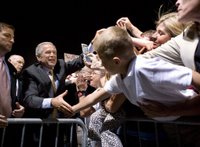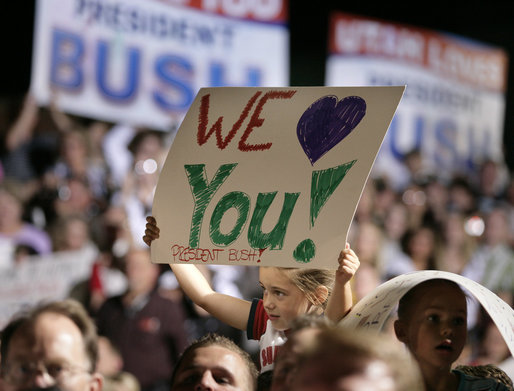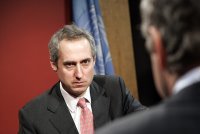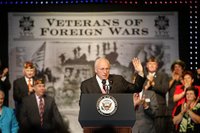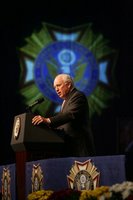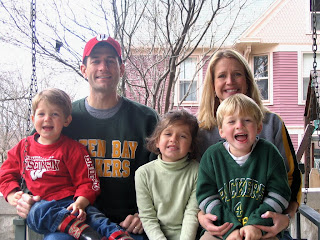President Bush Addresses American Legion National Convention, Salt Palace Convention Center, Salt Lake City, Utah Fact Sheet: Winning the Struggle Between Freedom and Terror in the Middle East and In Focus: National Security, 9:08 A.M. MDT
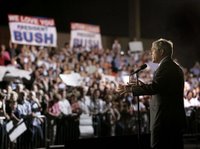 | President George W. Bush speaks to a crowd of nearly 2000 people during an airport welcome at the Utah Air National Guard in Salt Lake City, Utah, Aug. 30, 2006. White House photo by Eric Draper. |
Laura did remind me the other night, though, that a few of my fellow members -- at least I've joined a few of my fellow members in another illustrious organization, the "Over 60 Club." (Laughter.)
For almost 90 years, Legionnaires have stood proudly "for God and country." (Applause.) From big cities to small towns, the American Legion name brings to mind the best of our nation -- decency, generosity, and character. (Applause.) I thank you for a lifetime of service. I thank you for the positive contributions you make to our nation, and I'm proud to join you today.
First, I want to thank Tom Bock, the National Commander, for his kind introduction and his strong leadership. I always am pleased to welcome the Commander to the Oval Office to discuss common issues, and you've done a fine job leading this organization, Tom. I also want to thank your wife, Elaine, and I particularly want to pay respect to your son, Captain Bock, of the United States Army, who's joined us today. (Applause.)
I appreciate being here with Carol Van Kirk, the National President of the American Legion Auxiliary. And I want to thank all the Auxiliary members who are with us here today, as well. (Applause.)
I'm proud that the Governor of this great state, Jon Huntsman, and his wife Mary Kaye, have joined us. Governor, thank you for your time. I'm also proud to be joined by two United States Senators who are strong supporters of the United States military, Senator Orrin Hatch, and Senator Bob Bennett. (Applause.)
Members of the congressional delegation from the state of Utah have joined us: Congressman Rob Bishop, and Congressman Chris Cannon. Thank you both for coming. Proud you're here. (Applause.) I thank the state Senator, John Valentine, who is the President of the Utah State Senate. I appreciate Speaker Greg Curtis. I want to thank all the state and local officials who have joined us here today. Most particularly, I want to thank you all for giving me a chance to come and speak to you. I particularly want to thank all the Gold Star families who have joined us today. May God bless you. May God bless you. (Applause.)
As veterans, all of you stepped forward when America needed you most. From North Africa to Normandy, Iwo Jima to Inchon, from Khe Sanh to Kuwait, your courage and service have made it possible for generations to live in liberty. And we owe you more than just thanks. We owe you the support of the federal government. And so, in my first four years as President, we increased funding for veterans more than the previous administration did in eight years. (Applause.) Since then, we've increased it even more. My budget for this year provides more than $80 billion for veterans -- that's a 75-percent increase since I took office. It's the highest level of support for veterans in American history. (Applause.)
For many veterans, health care is a top priority, and it's a top priority of my administration. When Congress passes my 2007 budget, we will have increased the VA health care budget by 69 percent since 2001. We've extended treatment to a million additional veterans, including more than 300,000 men and women returning from Afghanistan and Iraq. (Applause.) We're building new VA facilities in places where veterans are retiring, so that more veterans can get top-quality health care closer to their homes.
I appreciate the Legion's strong history of care and compassion for your fellow veterans. Earlier this week, I traveled to Mississippi and Louisiana to mark the first anniversary of Hurricane Katrina. Veterans were hit hard by this storm, and American Legion posts all across the United States responded with vital relief. In an hour of suffering, you showed the good heart of our nation, and you showed the world that America can always count on Legionnaires. (Applause.)
I also appreciate the Legion's long history of supporting wise legislation in the Nation's Capital. Earlier this year, the Senate voted on a constitutional amendment to ban flag desecration -- we came within a single vote of passing it. The administration looks forward to continuing working with the American Legion to make sure we get this important protection in the Constitution of the United States of America. (Applause.)
Your organization supported another good piece of legislation called the Respect for America's Fallen Heroes Act. This bill ensures that families of fallen service members will not have to endure protests during military funerals. (Applause.)
My administration will also continue to work to locate the men and women in uniform whose fate is still undetermined -- our prisoners of war and personnel missing in action. We will not forget these brave Americans. We must not rest until we've accounted for every soldier, sailor, airman, Coast Guardsman, and Marine. And we will always honor their courage. (Applause.)
At this hour, a new generation of Americans in uniform is showing great courage in defending our freedom in the first war of the 21st century. I know that Legionnaires are following this war closely, especially those of you with family and friends who wear our uniform. The images that come back from the front lines are striking, and sometimes unsettling. When you see innocent civilians ripped apart by suicide bombs, or families buried inside their homes, the world can seem engulfed in purposeless violence. The truth is there is violence, but those who cause it have a clear purpose. When terrorists murder at the World Trade Center, or car bombers strike in Baghdad, or hijackers plot to blow up planes over the Atlantic, or terrorist militias shoot rockets at Israeli towns, they are all pursuing the same objective -- to turn back the advance of freedom, and impose a dark vision of tyranny and terror across the world.
The enemies of liberty come from different parts of the world, and they take inspiration from different sources. Some are radicalized followers of the Sunni tradition, who swear allegiance to terrorist organizations like al Qaeda. Others are radicalized followers of the Shia tradition, who join groups like Hezbollah and take guidance from state sponsors like Syria and Iran. Still others are "homegrown" terrorists -- fanatics who live quietly in free societies they dream to destroy. Despite their differences, these groups from -- form the outlines of a single movement, a worldwide network of radicals that use terror to kill those who stand in the way of their totalitarian ideology. And the unifying feature of this movement, the link that spans sectarian divisions and local grievances, is the rigid conviction that free societies are a threat to their twisted view of Islam.
The war we fight today is more than a military conflict; it is the decisive ideological struggle of the 21st century. (Applause.) On one side are those who believe in the values of freedom and moderation -- the right of all people to speak, and worship, and live in liberty. And on the other side are those driven by the values of tyranny and extremism -- the right of a self-appointed few to impose their fanatical views on all the rest. As veterans, you have seen this kind of enemy before. They're successors to Fascists, to Nazis, to Communists, and other totalitarians of the 20th century. And history shows what the outcome will be: This war will be difficult; this war will be long; and this war will end in the defeat of the terrorists and totalitarians, and a victory for the cause of freedom and liberty. (Applause.)
We're now approaching the fifth anniversary of the day this war reached our shores. As the horror of that morning grows more distant, there is a tendency to believe that the threat is receding and this war is coming to a close. That feeling is natural and comforting -- and wrong. As we recently saw, the enemy still wants to attack us. We're in a war we didn't ask for, but it's a war we must wage, and a war we will win. (Applause.)
In the coming days, I'll deliver a series of speeches describing the nature of our enemy in the war on terror, the insights we've gained about their aims and ambitions, the successes and setbacks we've experienced, and our strategy to prevail in this long war. Today, I'll discuss a critical aspect of this war: the struggle between freedom and terror in the Middle East, including the battle in Iraq, which is the central front in our fight against terrorism.
To understand the struggle unfolding in the Middle East, we need to look at the recent history of the region. For a half- century, America's primary goal in the Middle East was stability. This was understandable at the time; we were fighting the Soviet Union in the Cold War, and it was important to support Middle Eastern governments that rejected communism. Yet, over the decades, an undercurrent of danger was rising in the Middle East. Much of the region was mired in stagnation and despair. A generation of young people grew up with little hope to improve their lives, and many fell under the sway of radical extremism. The terrorist movement multiplied in strength, and resentment that had simmered for years boiled over into violence across the world.
Extremists in Iran seized American hostages. Hezbollah terrorists murdered American troops at the Marine barracks in Beirut and Khobar Towers in Saudi Arabia. Terrorists set off a truck bomb at the World Trade Center. Al Qaeda blew up two U.S. embassies in East Africa, and bombed the USS Cole. Then came the nightmare of September the 11, 2001, when 19 hijackers killed nearly 3,000 men, women, and children.
In the space of a single morning, it became clear that the calm we saw in the Middle East was only a mirage. We realized that years of pursuing stability to promote peace had left us with neither. Instead, the lack of freedom in the Middle East made the region an incubator for terrorist movements.
The status quo in the Middle East before September the 11th was dangerous and unacceptable, so we're pursuing a new strategy. First, we're using every element of national power to confront al Qaeda, those who take inspiration from them, and other terrorists who use similar tactics. We have ended the days of treating terrorism simply as a law enforcement matter. We will stay on the offense. We will fight the terrorists overseas so we do not have to face them here at home. (Applause.)
Second, we have made it clear to all nations, if you harbor terrorists, you are just as guilty as the terrorists; you're an enemy of the United States, and you will be held to account. (Applause.) And third, we've launched a bold new agenda to defeat the ideology of the enemy by supporting the forces of freedom in the Middle East and beyond.
The freedom agenda is based upon our deepest ideals and our vital interests. Americans believe that every person, of every religion, on every continent, has the right to determine his or her own destiny. We believe that freedom is a gift from an almighty God, beyond any power on Earth to take away. (Applause.) And we also know, by history and by logic, that promoting democracy is the surest way to build security. Democracies don't attack each other or threaten the peace. Governments accountable to the voters focus on building roads and schools -- not weapons of mass destruction. Young people who have a say in their future are less likely to search for meaning in extremism. Citizens who can join a peaceful political party are less likely to join a terrorist organization. Dissidents with the freedom to protest around the clock are less likely to blow themselves up during rush hour. And nations that commit to freedom for their people will not support terrorists -- they will join us in defeating them. (Applause.)
So America has committed its influence in the world to advancing freedom and democracy as the great alternatives to repression and radicalism. We will take the side of democratic leaders and reformers across the Middle East. We will support the voices of tolerance and moderation in the Muslim world. We stand with the mothers and fathers in every culture who want to see their children grow up in a caring and peaceful world. And by supporting the cause of freedom in a vital region, we'll make our children and our grandchildren more secure. (Applause.)
Over the past five years, we've begun to see the results of our actions -- and we have seen how our enemies respond to the advance of liberty. In Afghanistan, we saw a vicious tyranny that harbored the terrorists who planned the September the 11th attacks. Within weeks, American forces were in Afghanistan. Along with Afghan allies, we captured or killed hundreds of al Qaeda and Taliban fighters; we closed down their training camps, and we helped the people of Afghanistan replace the Taliban with a democratic government that answers to them. (Applause.)
Our enemies saw the transformation in Afghanistan, and they've responded by trying to roll back all the progress. Al Qaeda and the Taliban lost a coveted base in Afghanistan and they know they will never reclaim it when democracy succeeds. And so they're trying to return to power by attacking Afghanistan's free institutions. And they will fail. (Applause.) Forces from 40 nations, including every member of NATO, are now serving alongside American troops to support the new Afghan government. The days of the Taliban are over. The future of Afghanistan belongs to the people of Afghanistan. And the future of Afghanistan belongs to freedom. (Applause.)
In Lebanon, we saw a sovereign nation occupied by the Syrian dictatorship. We also saw the courageous people of Lebanon take to the streets to demand their independence. So we worked to enforce a United Nations resolution that required Syria to end its occupation of the country. The Syrians withdrew their armed forces, and the Lebanese people elected a democratic government that began to reclaim their country.
Our enemies saw the transformation in Lebanon and set out to destabilize the young democracy. Hezbollah launched an unprovoked attack on Israel that undermined the democrat government in Beirut. Yet their brazen action caused the world to unite in support for Lebanon's democracy. Secretary Rice worked with the Security Council to pass Resolution 1701, which will strengthen Lebanese forces as they take control of southern Lebanon -- and stop Hezbollah from acting as a state within a state.
I appreciate the troops pledged by France and Italy and other allies for this important international deployment. Together, we're going to make it clear to the world that foreign forces and terrorists have no place in a free and democratic Lebanon. (Applause.)
This summer's crisis in Lebanon has made it clearer than ever that the world now faces a grave threat from the radical regime in Iran. The Iranian regime arms, funds, and advises Hezbollah, which has killed more Americans than any terrorist network except al Qaeda. The Iranian regime interferes in Iraq by sponsoring terrorists and insurgents, empowering unlawful militias, and supplying components for improvised explosive devices. The Iranian regime denies basic human rights to millions of its people. And the Iranian regime is pursuing nuclear weapons in open defiance of its international obligations.
We know the death and suffering that Iran's sponsorship of terrorists has brought, and we can imagine how much worse it would be if Iran were allowed to acquire nuclear weapons. Many nations are working together to solve this problem. The United Nations passed a resolution demanding that Iran suspend its nuclear enrichment activities. Today is the deadline for Iran's leaders to reply to the reasonable proposal the international community has made. If Iran's leaders accept this offer and abandon their nuclear weapons ambitions, they can set their country on a better course. Yet, so far, the Iranian regime has responded with further defiance and delay. It is time for Iran to make a choice. We've made our choice: We will continue to work closely with our allies to find a diplomatic solution -- but there must be consequences for Iran's defiance, and we must not allow Iran to develop a nuclear weapon. (Applause.)
In Iraq, we saw a dictator who harbored terrorists, fired at military planes, paid the families of Palestinian suicide bombers, invaded a neighbor, and pursued and used weapons of mass destruction. The United Nations passed more than a dozen resolutions demanding that Saddam Hussein fully and openly abandon his weapons of mass destruction. We gave him a last chance to comply -- and when he refused, we enforced the just demands of the world. And now Saddam Hussein is in prison and on trial. Soon he will have the justice he denied to so many for so long. (Applause.) And with this tyrant gone from power, the United States, Iraq, the Middle East, and the world are better off. (Applause.)
In the three years since Saddam's fall the Iraqi people have reclaimed sovereignty of their country. They cast their ballots in free elections. They drafted and approved a democratic constitution and elected a constitutional democracy at the heart of the Middle East. Over the same period, Iraq has seen a rise of terrorist and insurgent movements that use brutal and indiscriminate violence to frustrate the desire of the Iraqi people for freedom and peace. Al Qaeda terrorists, former elements of Saddam's regime, illegal militias and unlawful armed groups are all working to undermine Iraq's new democracy. These groups have different long-term ambitions, but the same immediate goals. They want to drive America and our coalition out of Iraq and the Middle East, so they can stop the advance of freedom and impose their dark vision on the people of the Middle East. (Applause.)
Our enemies in Iraq have employed ruthless tactics to achieve those goals. They've targeted American and coalition troops with ambushes and roadside bombs. They've taken hostage and beheaded civilians on camera. They've blown up Iraqi army posts and assassinated government leaders. We've adapted to the tactics -- and thanks to the skill and professionalism of Iraqi and American forces, many of these enemies have met their end. At every step along the way, our enemies have failed to break the courage of the Iraqi people; they have failed to stop the rise of Iraqi democracy -- and they will fail in breaking the will of the American people. (Applause.)
Now these enemies have launched a new effort. They have embarked on a bloody campaign of sectarian violence, which they hope will plunge Iraq into a civil war. The outbreak of sectarian violence was encouraged by the terrorist Zarqawi, al Qaeda's man in Iraq who called for an "all-out war" on Iraqi Shia. The Shia community resisted the impulse to seek revenge for a while. But after this February bombing of the Shia Golden Dome Mosque in Samarra, extremist groups mobilized and sectarian death squads formed on the streets of Baghdad and other areas. Our Ambassador reports that thousands of Iraqis were murdered in Baghdad last month, and large numbers of them were victims of sectarian violence.
This cruelty and carnage has led some to question whether Iraq has descended into civil war. Our commanders and our diplomats on the ground in Iraq believe that's not the case. They report that only a small number of Iraqis are engaged in sectarian violence, while the overwhelming majority want peace and a normal life in a unified country. Iraqi leaders from all backgrounds remember the elections that brought them to power, in which 12 million Iraqis defied the car bombers and killers to claim, "We want to be free." (Applause.)
Iraq's government is working tirelessly to hold the nation together and to heal Iraq's divisions, not to exploit them. The Iraqi people have come a long way. They are not going to let their country fall apart or relapse into tyranny. As Prime Minister Maliki told the United States Congress, "Iraqis have tasted freedom and we will defend it absolutely." (Applause.)
America has a clear strategy to help the Iraqi people protect their new freedom, and build a democracy that can govern itself, and sustain itself, and defend itself. On the political side, we're working closely with Prime Minister Maliki to strengthen Iraq's unity government and develop -- and to deliver better services to the Iraqi people. This is a crucial moment for the new Iraqi government; its leaders understand the challenge. They believe that now is the time to hammer out compromises on Iraq's most contentious issues.
I've been clear with each Iraqi leader I meet: America is a patient nation, and Iraq can count on our partnership, as long as the new government continues to make the hard decisions necessary to advance a unified, democratic and peaceful Iraq. Prime Minister Maliki has shown courage in laying out an agenda to do just that -- and he can count on an ally, the United States of America, to help him promote this agenda. (Applause.)
On the security side, we're refining our tactics to meet the threats on the ground. I've given our commanders in Iraq all the flexibility they need to make adjustments necessary to stay on the offense and defeat the enemies of freedom. We've deployed Special Operation forces to kill or capture terrorists operating in Iraq. Zarqawi found out what they can do. We continue to train Iraqi police forces to defend their own nation. We've handed over security responsibility for a southern province to Iraqi forces. Five of Iraq's 10 army divisions are now taking the lead in their areas of operation. The Iraqi security forces are determined; they're becoming more capable; and together, we will defeat the enemies of a free Iraq. (Applause.)
Recently, we also launched a major new campaign to end the security crisis in Baghdad. Side by side, Iraqi and American forces are conducting operations in the city's most violent areas to disrupt al Qaeda, to capture enemy fighters, crack down on IED makers, and break up the death squads. These forces are helping Iraq's national police force undergo retraining to better enforce law in Baghdad. And these forces are supporting the Iraqi government as it provides reconstruction assistance.
The Baghdad Security Plan is still in its early stages. We cannot expect immediate success. Yet, the initial results are encouraging. According to one military report, a Sunni man in a diverse Baghdad neighborhood said this about the Shia soldiers on patrol: "Their image has changed. Now you feel they're there to protect you." Over the coming weeks and months, the operation will expand throughout Baghdad. until Iraq's democratic government is in full control of its capital. The work is difficult and dangerous, but the Iraqi government and their forces are determined to reclaim their country. And the United States is determined to help them succeed. (Applause.)
Here at home we have a choice to make about Iraq. Some politicians look at our efforts in Iraq and see a diversion from the war on terror. That would come as news to Osama bin Laden, who proclaimed that the "third world war is raging" in Iraq. It would come as news to the number two man of al Qaeda, Zawahiri, who has called the struggle in Iraq, quote, "the place for the greatest battle." It would come as news to the terrorists from Syria, Saudi Arabia, Egypt, Sudan, Libya, Yemen and other countries, who have to come to Iraq to fight the rise of democracy.
It's hard to believe that these terrorists would make long journeys across dangerous borders, endure heavy fighting, or blow themselves up in the streets of Baghdad, for a so-called "diversion." Some Americans didn't support my decision to remove Saddam Hussein; many are frustrated with the level of violence. But we should all agree that the battle for Iraq is now central to the ideological struggle of the 21st century. We will not allow the terrorists to dictate the future of this century -- so we will defeat them in Iraq. (Applause.)
Still, there are some in our country who insist that the best option in Iraq is to pull out, regardless of the situation on the ground. Many of these folks are sincere and they're patriotic, but they could be -- they could not be more wrong. If America were to pull out before Iraq can defend itself, the consequences would be absolutely predictable -- and absolutely disastrous. We would be handing Iraq over to our worst enemies -- Saddam's former henchmen, armed groups with ties to Iran, and al Qaeda terrorists from all over the world who would suddenly have a base of operations far more valuable than Afghanistan under the Taliban. They would have a new sanctuary to recruit and train terrorists at the heart of the Middle East, with huge oil riches to fund their ambitions. And we know exactly where those ambitions lead. If we give up the fight in the streets of Baghdad, we will face the terrorists in the streets of our own cities.
We can decide to stop fighting the terrorists in Iraq and other parts of the world, but they will not decide to stop fighting us. General John Abizaid, our top commander in the Middle East region, recently put it this way: "If we leave, they will follow us." And he is right. The security of the civilized world depends on victory in the war on terror, and that depends on victory in Iraq. So the United States of America will not leave until victory is achieved. (Applause.)
Victory in Iraq will be difficult and it will require more sacrifice. The fighting there can be as fierce as it was at Omaha Beach or Guadalcanal. And victory is as important as it was in those earlier battles. Victory in Iraq will result in a democracy that is a friend of America and an ally in the war on terror. Victory in Iraq will be a crushing defeat for our enemies, who have staked so much on the battle there. Victory in Iraq will honor the sacrifice of the brave Americans who have given their lives. And victory in Iraq would be a powerful triumph in the ideological struggle of the 21st century. From Damascus to Tehran, people will look to a democratic Iraq as inspiration that freedom can succeed in the Middle East, and as evidence that the side of freedom is the winning side. This is a pivotal moment for the Middle East. The world is watching -- and in Iraq and beyond, the forces of freedom will prevail. (Applause.)
For all the debate, American policy in the Middle East comes down to a straightforward choice. We can allow the Middle East to continue on its course -- on the course it was headed before September the 11th, and a generation from now, our children will face a region dominated by terrorist states and radical dictators armed with nuclear weapons. Or we can stop that from happening, by rallying the world to confront the ideology of hate, and give the people of the Middle East a future of hope. And that is the choice America has made. (Applause.)
We see a day when people across the Middle East have governments that honor their dignity, unleash their creativity, and count their votes. We see a day when leaders across the Middle East reject terror and protect freedom. We see a day when the nations of the Middle East are allies in the cause of peace. The path to that day will be uphill and uneven, but we can be confident of the outcome, because we know that the direction of history leads toward freedom.
In the early years of our republic, Thomas Jefferson said that we cannot expect to move "from despotism to liberty in a featherbed." That's been true in every time and place. No one understands that like you, our veterans, understand that. With the distance of history, it can be easy to look back at the wars of the 20th century and see a straight path to victory. You know better than that. You waged the hard battles, you suffered the wounds, you lost friends and brothers. You were there for dark times and the moments of uncertainty. And you know that freedom is always worth the sacrifice.
You also know what it takes to win. For all that is new about this war, one thing has not changed: Victory still depends on the courage and the patience and the resolve of the American people. Above all, it depends on patriots who are willing to fight for freedom. (Applause.) Our nation is blessed to have these men and women in abundance. Our military forces make this nation strong; they make this nation safe; and they make this nation proud. (Applause.)
We thank them and their families for their sacrifice. We will remember all those who have given their lives in this struggle -- and I vow that we will give our men and women in uniform all the resources they need to accomplish their missions. (Applause.)
One brave American we remember is Marine Corporal Adam Galvez, from here in Salt Lake City. Yesterday Adam's mom and dad laid their son to rest. We're honored by their presence with us today. (Applause.) About a month ago, Adam was wounded by a suicide bomb in Iraq's Anbar Province. When he regained consciousness, he found he was buried alive, so he dug himself out of the rubble. And then ran through gunfire to get a shovel to dig out his fellow Marines. As soon as he recovered from his injuries, Adam volunteered to go back to the front lines. and 11 days ago, he was killed when a roadside bomb hit his convoy.
Here is what Adam's mom and dad said about the cause for which their son gave his life: "Though many are debating the justification of this war, Adam believed in his country -- Adam's belief in his country did not waver, even to the point of the ultimate sacrifice. It's our hope and our prayer that people share the same conviction and dedication to our troops and fellow Americans." (Applause.)
Our nation will always remember the selflessness and sacrifice of Americans like Adam Galvez. We will honor their lives by completing the good and noble work they have started. (Applause.) And we can be confident that one day, veterans of the war on terror will gather at American Legion halls across the country, and say the same things you say: We made our nation safer; we made a region more peaceful; and we left behind a better world for our children and our grandchildren. (Applause.)
Thanks for having me. May God bless our veterans. May God bless our troops. And may God continue to bless the United States of America. (Applause.)
END 9:52 A.M. MDT
For Immediate Release, Office of the Press Secretary, August 31, 2006
Technorati Tags: President Bush and White House or September the 11th and VIDEO and Abu Musab al-Zarqawi or War on Terror and Iraq or al Qaeda and terrorists or Osama bin Laden and Prime Minister Maliki or special operation forces, and American Legion National Convention, or VIDEO
Related: Keyword Iraq, Wednesday, June 14, 2006 Press Conference of the President 06/14/06 (VIDEO), Friday, June 09, 2006 the President on Death Zarqawi (VIDEO), Thursday, May 11, 2006 President Discusses NSA Surveillance Program (VIDEO, Monday, March 20, 2006 Third Anniversary of Beginning of Iraq Liberation (VIDEO), Tuesday, March 14, 2006 President Discusses Freedom and Democracy in Iraq, 03/13/05 VIDEO, Thursday, March 09, 2006 President Signs USA PATRIOT Act (VIDEO), Saturday, February 25, 2006 President Addresses American Legion, Discusses Global War on Terror (VIDEO), Wednesday, January 25, 2006 President Discusses War on Terror at K-State (VIDEO), Wednesday, January 04, 2006 President Discusses War on Terror Following Pentagon Briefing (VIDEO), Monday, December 19, 2005 President's Address to the Nation (VIDEO) 12/18/05, Thursday, December 15, 2005 President, McCain, Warner, Discusses Interrogation, Wednesday, December 14, 2005 Iraqi Elections, Victory in the War on Terror (VIDEO), Monday, December 12, 2005 President Discusses War on Terror and Upcoming Iraqi Elections (VIDEO), Sunday, July 17, 2005 Soldiers charged with assault on suspected insurgents, Sunday, July 24, 2005 Iraqi, American Women Discuss Constitution, Women's Rights, Thursday, July 28, 2005 Killing of Algerian Diplomats to Iraq, Saturday, August 06, 2005 Operation Quick Strike,








